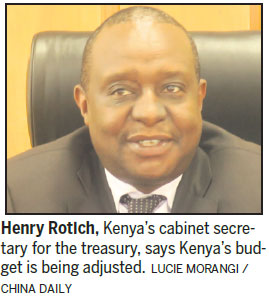Kenya debt level called sustainable
By Lucie Morangi | China Daily Africa | Updated: 2018-04-09 08:55
Cabinet secretary for the treasury says government is ensuring 'high levels of fiscal discipline'
Henry Rotich, Kenya's cabinet secretary for the treasury, maintains a bullish outlook for the country's debt level, saying it is sustainable and adding that the government is establishing effective spending controls to rein in borrowing.
He says prolonged general elections and the drought in 2017 had unforeseeable negative impacts on the economy, hurting growth and revenue collection.
"We are therefore adjusting our budget to ensure high levels of fiscal discipline and be able to maintain planned activities within the approved appropriation to keep our debt levels within our benchmarks, as we have always done over the years," says Rotich.
His remarks come at a time when experts are concerned about the country's rising debt, which has reached $297.3 billion (227 billion euros; £199 billion) - a debt-to-GDP ratio of more than 50 percent. It also comes barely a month after then US secretary of state Rex Tillerson accused China of pushing up Africa's debt levels, saying this compromised sovereignty by encouraging dependency.
However, Rotich says the loans are used for infrastructure development such as railways, roads, airports, energy projects, education and health, which he describes as economic enablers. He also says the cutbacks will not affect ongoing programs.

According to Rotich, many foreign governments do not yet understand Sino-African engagement. "They don't understand the type of relationship Africa has built with China over the years. It is within the Forum on China-Africa Cooperation platform that we have developed a clear and transparent engagement," he says.
Rotich adds that Kenya is trying to replicate China's economic success, which has seen the Asian country lift millions of people out of poverty. "China understands our development model, and this is a country that is sharing their experiences."
He says the days of dictating to Africa are long gone, replaced by an era of partnership. "China has pursued a developmental path with Africa and this is the way to go. Development is for everybody, and countries are looking at how other partners can contribute and align their assistance along national strategies to ensure that success is shared."
He says Kenya is working on bringing the success of government-to-government engagement to the private sector.
On private-private partnership, Rotich says the government has been strengthening the legal framework to enable financing models such as build-operate-transfer and build-own-operate-transfer in the booming infrastructure sector. He says there are energy projects under this model, such as the $2 billion Lamu coal plant, which is a joint venture between a local company and a group of Chinese enterprises, and the $1.49 billion road expansion project on a 180-kilometer stretch of road between the cities of Nairobi and Nakuru.
"However, we have to understand that this is new and complex," Rotich says.
The treasury minister also confirmed plans to create a national investment council to speed up completion of mega-projects such as special economic zones. The council, which would include the president, the ministers of land, finance and foreign affairs and the attorney general, is expected to improve coordination and approval of projects.
Rotich says infrastructure will continue to be a government priority. "We are also focusing on the president's Big Four agenda and plan to present these strategies during the forthcoming FOCAC event in Beijing."
Spearheaded by President Uhuru Kenyatta, the Big Four aims at strengthening food security, affordable housing, manufacturing and affordable healthcare.
On the trade tensions between China and the United States, the treasury minister says that protectionism exhibited by the US is eroding the gains of economic globalization and will slow down growth. "Openness has helped improve competitiveness of countries. Having barriers will create inefficiencies in some countries and reduce productivity. ... No one wins."
However, he says he believes that projects under the China-led Belt and Road Initiative will accelerate regional integration and promote intra-Africa trade.
























